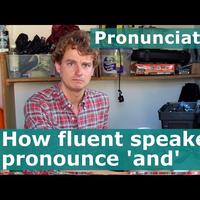9- How do fluent speakers pronounce 'and'?
cum|fac||||
9- Wie sprechen fließend sprechende Menschen das Wort "und" aus?
9- ¿Cómo pronuncian "y" los hablantes fluidos?
9- Comment les personnes qui parlent couramment prononcent-elles "et" ?
9- Come si pronuncia la parola "e"?
9- 流暢なスピーカーは「and」をどのように発音するか?
9- 유창한 화자들은 '그리고'를 어떻게 발음하나요?
9- Hoe spreken vloeiend sprekenden 'en' uit?
9- Jak płynni mówcy wymawiają "i"?
9- Como é que os falantes fluentes pronunciam "and"?
9- Как произносят 'and' носители языка?
9- Akıcı konuşanlar 've' kelimesini nasıl telaffuz ederler?
9- Як вільно вимовляють "і" носії мови?
9- 口语流利的人如何发音 "和"?
9- 流利的人如何發音「and」?
Hi. I'm Tim and this is my Pronunciation Workshop. Here, I'm going to show you how English is
really spoken. Come on, let's go inside.
Hey, look at this: a present. All wrapped up in
|||||||wrapped||
|||||||envuelto||
مهلا، انظر إلى هذا: هدية. كل ملفوفة في
paper. Now, do you know what this is? Well, if you could smell it, it might give you a clue.
|||||||||||||||||||pista
ورق. الآن، هل تعرف ما هذا؟ حسنًا، إذا كنت تستطيع شمها، فقد تعطيك فكرة.
Is it your old socks?
||||pair of socks
||||靴下
||||calcetines
Very funny - No. No, it's not my old socks. It's something much, much nicer. Something
|||||||||||||素敵な|
||||||||calcetines viejos||||||
delicious in fact. Let's ask the people of London if they can tell what it is, without seeing it.
|||||||||||||||||ver|
Fish and chips.
Fish and chips. Fish and chips.
Fish and chips. Fish and chips.
Yes, that's right. It's good old fish and chips. I'm going to save that for later.
|||||||||私は||||||
|||||||||||||||пізніше
Так, саме так. Стара добра риба з картоплею. Прибережу це на потім.
Now the word 'and' has got three sounds, hasn't it? /æ/, /n/, /d/ - but listen again.
||||||||||æ|||||
||||||||||/æ/|||||
Тепер слово "і" має три звуки, чи не так? /æ/, /n/, /d/ - але послухайте ще раз.
How is it pronounced in everyday speech?
Як воно вимовляється в повсякденній мові?
Fish and chips.
Fish and chips. Fish and chips.
Fish and chips. Fish and chips.
And is not usually an important word. It's a basic conjunction and it's frequently unstressed.
||||||||||сполучник||||
|||usualmente|||||||conjunción||||sin énfasis
||||||||||||||強調されない
وهي ليست عادة كلمة مهمة. إنه اقتران أساسي وغالبًا ما يكون غير مضغوط.
When this happens, the /d/ at the end of the word disappears before both vowels and consonants,
|||||||||||消えます|||||
||sucede||/d/||||||Cuando esto ocurre|desaparece|||||
これが起こると、単語の最後の /d/ が母音と子音の両方の前に消えます。
Коли це відбувається, /d/ в кінці слова зникає як перед голосними, так і перед приголосними,
and the vowel sound at the beginning of the word changes to schwa: /ə/, so 'and' becomes
||||||||||||シュワ|シュワ|||
і голосний звук на початку слова змінюється на schwa: /ə/, таким чином "і" стає
/ən/ or even /n/ as the sounds are almost identical. Here are some more examples.
||||||||casi|idénticos|||||
エン|||n|||||||||||
/ən(1)/||||||||||||||
/ən/ або навіть /n/, оскільки звуки майже ідентичні. Ось ще кілька прикладів.
I'm going to go and get the shopping.
Vou buscar as compras.
Піду за покупками.
Apples and oranges are my favourite fruits. I've been thinking and thinking but I can't
リンゴ||||||果物||||||||
Яблука та апельсини - мої улюблені фрукти. Я думав і думав, але не можу
decide. We went for a coffee and something to eat.
вирішувати. Ми пішли випити кави та перекусити.
Right, so you've heard the examples, and now it's your turn. You know the drill. Listen
||||||||||||||procedure|
||||||||||||||процедуру|
||||||||||||||sabes cómo es|
حسنًا، لقد سمعت الأمثلة، والآن حان دورك. أنت تعرف التدريبات. يستمع
Отже, ви почули приклади, тепер ваша черга. Ти знаєш, що робити. Слухайте.
and repeat.
I'm going to go and get the shopping.
Піду за покупками.
Apples and oranges are my favourite fruits.
Яблука та апельсини - мої улюблені фрукти.
I've been thinking and thinking but I can't decide.
Я думав і думав, але не можу вирішити.
We went for a coffee and something to eat.
Wir gingen auf einen Kaffee und etwas zu essen.
Great work. Remember, if you want to learn more about pronunciation, then please visit
our website, bbclearningenglish dot com. And that is about it from the Pronunciation Workshop
||BBC Learning English|||||||それ||||
for now. I'll see you next week. Bye! Now, there's only one thing to eat with fish 'n'
поки що. Побачимося наступного тижня. Бувай! Є тільки одна річ, яку можна їсти з рибою.
chips - and that's salt 'n' vinegar. This reminds me of one of my favourite jokes: What
|||||vinegar||brings||||||||
|||||酢||||||||||
чіпси - і це сіль з оцтом. Це нагадує мені один з моїх улюблених анекдотів: Що
do angry sharks eat? Fish 'n' ships. Get it? Fish 'n' ships! Oh, I don't know why I bother.
||sharks||||and chips||||||||||||
||サメ||||||||||||||||
هل تأكل أسماك القرش الغاضبة؟ سفن الأسماك. احصل عليه؟ سفن الأسماك! أوه، لا أعرف لماذا أزعجني.
fressen wütende Haie? Fish 'n' Schiffe. Kapiert? Fish 'n' Schiffe! Oh, ich weiß nicht, warum ich mir die Mühe mache.
що їдять злі акули? Рибу і кораблі. Зрозумів? Риба та кораблі! Не знаю, навіщо я турбуюся.
Ok, now, time to eat. What? What is this? What is going on? Where's the...? It really
Гаразд, час їсти. Що? Що це таке? Що відбувається? Де...? Це справді
is fish... and ships! Well that is the last time I'm telling that joke. This is no laughing
це риба... і кораблі! Ну, це останній раз, коли я розповідаю цей жарт. Це не смішно.
matter. I'm hungry now...
не має значення. Я зараз голодний...

